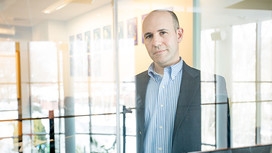
As a graduate student in the late 1990s, Andy Molinsky worked at an agency in Boston helping Russian immigrants find jobs in the US. The applicants were well-qualified but they struggled during interviews. They intellectually understood the cultural customs of the typical US job interview – smile, make eye contact and engage in small talk – but they found it hard to do so because it went against their culturally ingrained behaviour.
20世纪90年代末,还是研究生的安迪•莫林斯基(Andy Molinsky,见右图)曾供职于波士顿的一家中介,帮助俄罗斯移民在美国找到工作。俄罗斯求职者的素质不错,但他们在面试时总感觉不自在。他们虽然知道典型的美国招聘面试需要遵循的文化习惯,例如微笑、有目光接触、和对方轻松地闲聊,但他们发现自己很难做到这些,因为这些与他们深受本民族文化影响的行为方式是抵触的。
Now an associate professor of organisational behaviour at Brandeis International Business School, Massachusetts, Prof Molinsky was motivated to learn more about overcoming the challenges of cultural identity in the workplace. His book Global Dexterity (Harvard Business School Press) aims to help managers learn how to culturally code-switch when working in an international setting.
如今,已是马萨诸塞州布兰迪斯国际商学院(Brandeis International Business School)组织行为学副教授的莫林斯基,致力于在克服工作环境中的文化认同障碍方面,做出更多探索。他的新作《全球变通力》(Global Dexterity,哈佛商学院出版社出版)旨在帮助管理人员学会在国际环境中如何进行文化转换和调整。
What is global dexterity?
何为全球变通力?
It’s the ability to adapt your behaviour across cultures without losing yourself in the process – fitting in without giving in. When you’re making your way in an international culture you will find yourself in situations where how you would act in your native culture is different from the way you are expected to act in your new culture. This could range from how you pitch yourself to an investor, to how you motivate employees, to how you give performance feedback.
全球变通力是在不同文化间调整行为方式、但同时避免迷失自我的能力——融入但不丧失自我。当你行走在一个国际文化的环境中时会发现,按本国文化做事情的方式,与你在新的文化中应该遵循的做事方式是不同的。这种情况可能出现在如何向投资者推销你自己、如何激励员工,以及如何进行业绩反馈等问题上。
Why is global dexterity a ‘critical skill’ for today’s managers?
为什么全球变通力对今天的管理人员来说是一项“重要技能”?
Everything you need to do in order to do your job well has the potential to vary across cultures. So you need the ability to not only diagnose and understand these differences but also to be able to shift and adjust your behaviour accordingly. If you don’t, you risk being ineffective: you won’t be able to achieve your goals or the goals of the business.
人们为了做好工作而需要做的每件事,都可能在不同的文化中有所变化。因此,需要的不仅是辨别和理解这些差异的能力,还有相应地转变和调整行为的能力。如果你不具备上述能力,则可能面临行动无果的风险:你将不能完成个人或公司的目标。
举例说明
Take one of my MBA students from Beijing going to a networking event on campus with potential employers. He is aware of the US-style assertiveness and self-promotional behaviour necessary. He knows that Americans openly tout their skills and accomplishments and are less deferential to potential employers. But for the Beijing student the real challenge is adapting his behaviour because it goes against the notions of power and respect ingrained in him since he was a kid. Some international students have told me they avoid going to career fairs because it’s so uncomfortable for them.
拿我的一个来自北京的MBA学生为例,他准备参加一次校园商业社交活动,其中有他潜在的雇主。他知道有必要表现出美国式的强烈自信,并积极自我推销。他也知道美国人会公开吹嘘自己的经验成就,并且不会对潜在的雇主毕恭毕敬。但这与他从小就根植在脑子里的尊敬权力的意识是相抵触的,因此,调整行为对他确实是一个艰难的挑战。一些国际学生曾对我说,他们躲避参加招聘会,因为那里让他们很不舒服。
How do you master global dexterity?
如何掌握全球变通力?
It’s about customising a style that works for you. Sometimes it requires eliminating certain behaviours, other times it can be something as small as a linguistic change. For example, in Russia, consulting firms are very hierarchical. You don’t necessarily vie for projects – you’re slotted into them. One Russian student realised her US colleagues were advocating for themselves and she was losing out on the best work. But telling her boss, “I’d love to work on this project”, felt too difficult for her. Her solution was to customise her language and ask: “Can I be helpful on this project?”.
要领在于形成一套对你有效的特定行为方式。有时它要求你避免某些行为,有时则可能只是语言调整这类小的改变。举个例子。在俄罗斯,咨询公司内部等级森严。你不需要主动争取加入项目,而只需要被动地被安排进项目里。一个俄罗斯学生意识到,她的美国同事在不断通过毛遂自荐的方式来争取各种机会,而她却在慢慢失去最好的项目。但对她来说,告诉老板“我很愿意做这个项目”是太困难的事了。她的解决办法是,调整语言,用提问的方式说:“对这个项目,我能帮上什么忙吗?”
Are some better at this than others?
是不是有些人的变通能力更强?
There are some people who are naturally more socially skilled and attuned to social and cultural cues. But there are many individuals who aren’t able to do that as easily. I strongly believe anyone can learn this stuff. It’s a skill; there’s no global dexterity gene.
有些人天生就有比别人更强的社交能力,以及对不同社会和文化的适应能力。但很多人并不能轻松地做到这些。我坚信,任何人都可以学习这些能力。这是一种经验;全球变通力不是天生的。
Are business schools missing an opportunity here?
在这方面商学院是否有个机会没抓住?
A lot of business schools do short-term immersion trips and have this idea that: “We are global. We send you abroad. By osmosis you’ll learn from people of other cultures.” This is a nice first step but it doesn’t equip people to be effective global leaders. There’s no framework or tools. We need to sensitise people to these issues.
许多商学院设立了短期的浸入式学习之旅,它们认为:“我们是国际化的商学院,我们把你送到国外去。通过耳濡目染的影响,你会从其他文化的人身上学到东西。”这是很好的第一步,但出国并没有让人们具备成为有效的全球领导者的能力,因为它缺少框架或工具。我们需要让人们更敏感地意识到这些问题。













